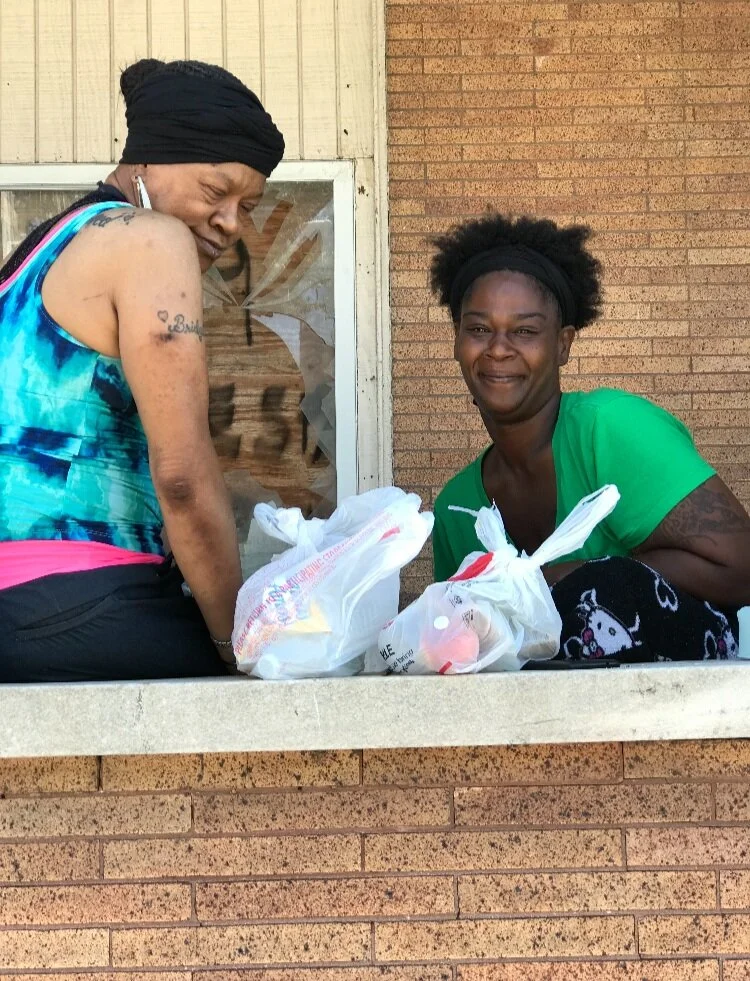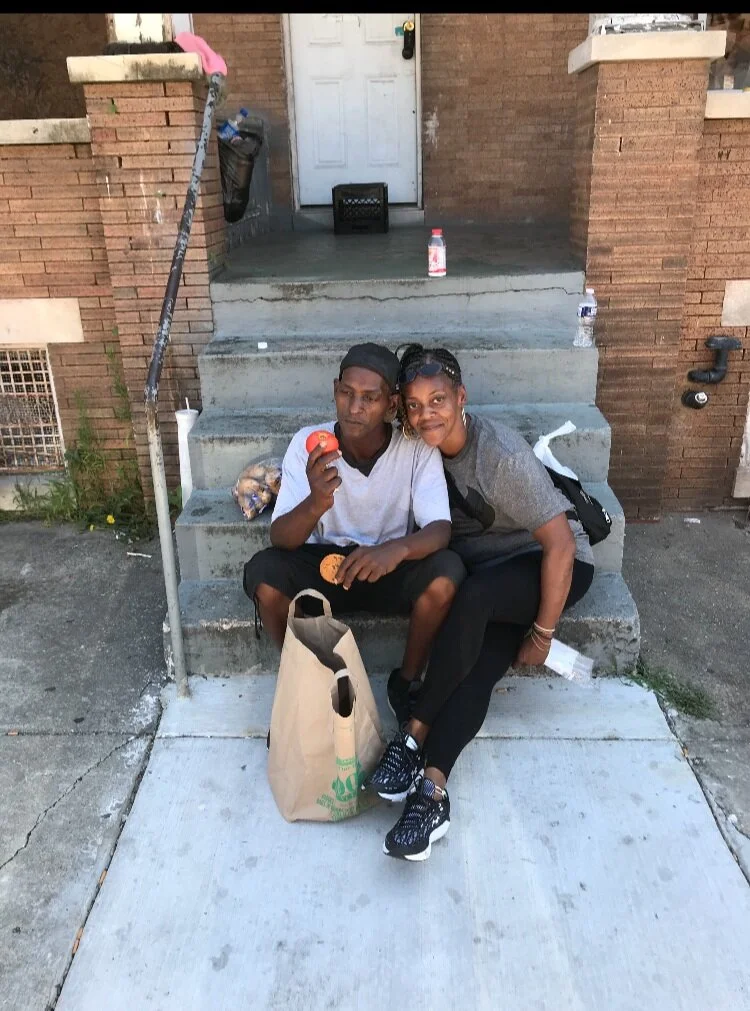The SALT of the City
Local group helps to feed thousands of people in Baltimore.
By Sasha Allen
Sirens wail faintly in the distance, drowned out by the sounds of blasting rap music coming from an old, beige Toyota Corolla. It’s nearly 1 p.m. on a humid July Saturday in Baltimore, and people are scattered across the street; talking in the shade of a young tree on a concrete slab in the middle of the intersection, on their front steps, and sitting up against a crumbling, brick wall. Two cars pull up to the triangle island in the center of the busy, three-way intersection. Volunteers, each holding boxes of lunches and bags of masks, step out and ask: “Are you hungry? Do you want a lunch?” to which almost every single response is “Yes, thank you.”
In Baltimore City, where over 23% of the city's population lives below the poverty line, a group, called Service with Action and Love Together, also known as SALT, collects donations to make and distribute thousands of lunches and masks to the homeless and hungry living in some of the city's poorest communities.
One of the people SALT served in the intersection was a woman who prefers to be called “Lady D." During the pandemic, she has struggled to afford food for her family.
“I work, but they cut my hours so bad, I don't even have enough money to pay my rent,” says Lady D. “And it's crazy, I'm an essential worker. I'm a cook in the kitchen, you know, like (I) work 4-8 or 2-4, and that's not enough money to do anything. My rent is $1,000.”
And she's not alone. This June, 257,762 people in Baltimore City filed for unemployment, over double the number from January. Because of this, many live off of food that’s distributed through numerous programs and groups.
“Some of these people around here depend on y’all,” acknowledges Lady D.
Lady D is referring to SALT, the program serving food to people in Baltimore. Before the pandemic hit, SALT had been serving 600 hot meals a week on the streets at various locations across Baltimore. But when the virus swept through the city, occupants were faced with 10,000 confirmed cases and 400 deaths, as of July 27, meaning the system had to be revamped to adhere to new restrictions and safety guidelines.
Now, the group hands out bagged lunches on the streets, made and packaged in the cafeteria of Our Lady of Perpetual Health Primary School.
The first week of the switch from hot food to the bagged lunch program, there were three families who made roughly 325 lunches for distribution. Six months later, with 40-plus volunteers ranging from sixth graders to senior citizens and multiple partnerships with companies that donate necessities like truckloads of fruit and boxes stacked full of donuts, the group is distributing around 4,000 lunches a week to churches, shelters, employment centers, retirement homes and meal distribution sites.
Despite the current successes, York Bradshaw, one of the primary organizers, said the switch was drastic.
“This caused great sadness among SALT participants because we had never allowed weather to interfere with feeding the poor and homeless,” Bradshaw says. “But now we faced something worse than bad weather. So we made a decision: We have to continue to feed people, no matter what! The only option for us was to prepare full bag lunches and serve them to people on the street while practicing physical distancing and safe serving practices.”
Courtesy York Bradshaw
Every week from Thursday to Sunday, volunteers drive into Baltimore to distribute the lunches — each including five items: a drink, a sandwich, a savory snack, a dessert and a piece of fruit — at numerous locations all across the city to give the food to anyone who might need it. The food goes to people in the poorest communities in Baltimore including streets like North Broadway and many communities across West Baltimore.
One of the weekly stops is Maryland Baptist Aged Home in West Baltimore, a facility that has been able to avoid COVID-19. This nursing home, because of its limited funding from Medicare, takes donations from the program.
“Sometimes people don't have a lot of family, or their income is limited so this actually helps us out a lot,” says Joy Burton, the homes’ activities assistant. “We don't have a lot of snacks; we mainly just provide the basics.”
According to Burton, the program does more than just help the home. “(SALT also) passes out to the neighborhood. It helps the community...it’s hard out here for a lot of people.”
However, the growth of SALT's outreach has not been easy. There have been hours of hard work, phone calls and sandwich making to make the program a growing success. Bradshaw, along with many other volunteers, works long hours contacting local businesses, recruiting volunteers for both donations and distribution, and soliciting monetary and physical donations.
But Bradshaw and his colleagues are driven to help those in need — and are constantly inspired by those with very little give back too.
Courtesy York Bradshaw
“Fairly early in the pandemic, Patricia (a volunteer) and I had distributed lunches to a group of recently arrived immigrants to the city. Some were homeless, all had great need of food," Bradshaw recalls. They gave everyone two bagged lunches at 10 a.m. so they'd have enough for two meals that day.
Later, Bradshaw and his team were driving up another street and saw a man who had received two meals earlier that day. They saw him stop to talk to a man in a wheelchair, and after a brief conversation, he pulled out one of his lunches and gave it to the man in the wheelchair.
"We drove up to the men and stopped. The man in the wheelchair, Brian, said that the other man, Jose, had stopped and asked him (in halting English), ‘Are you hungry?’ Brian said yes and Jose never hesitated for a moment. This man gave away his dinner for the night to help a man whom he had just met on the street. It was incredibly moving,” Bradshaw says.
It’s moments like these that motivate so many people to volunteer.
“I personally am involved because Christ commands us to feed the hungry. And I know that many of us feel that we are serving Christ by serving others,” Bradshaw says. “That being said, we have several incredible volunteers who are not religious and even a couple of professed atheists. We have drawn together a diverse group of people who are motivated to help the homeless and hungry.”
From 325 lunches the first week to 4,000 and counting, these volunteers are motivated to continue improving their service to their community, even in the middle of a global pandemic. As Lady D says, “We just gotta stay positive.”
To donate or learn more, visit olphparish.org/salt.
About the Writer:
Sasha Allen of Ellicott City, Maryland
Sasha is a rising senior who lives in Maryland. She is interested in pursuing journalism as a major in the future and is managing editor of her school's newspaper, The Wingspan. She lives with her parents and two brothers, and in her free time likes to read and hang out with friends.


